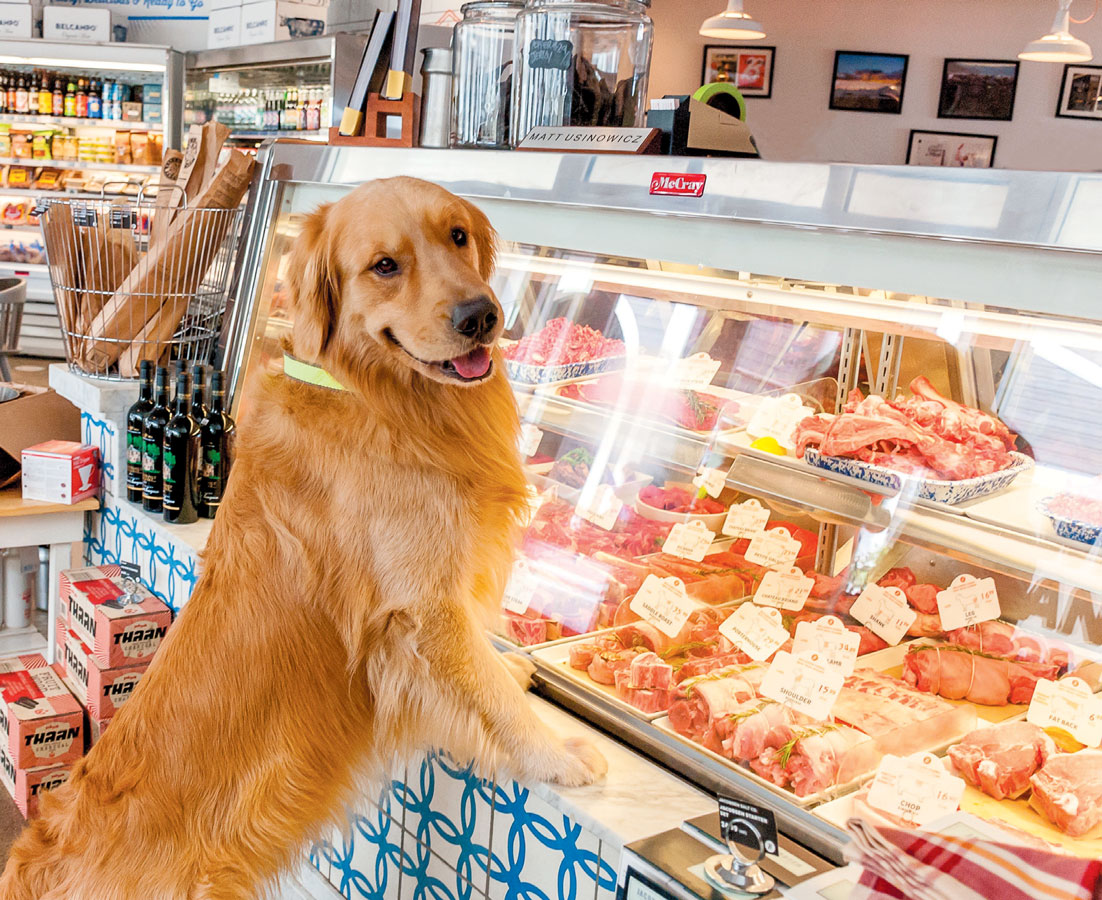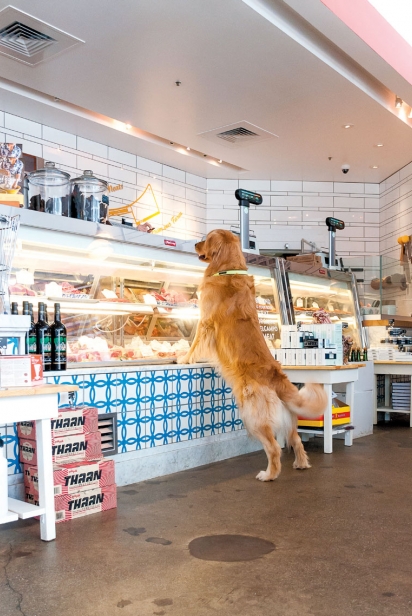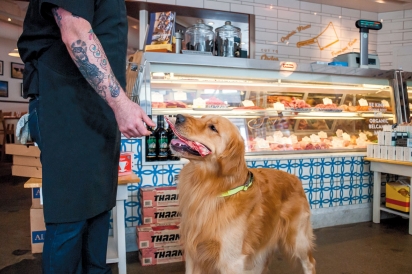Don’t Forget Fido
Meals Worthy of Man’s Best Friend
In our home our dogs have always been treated as part of the family. They exercise with us. They watch movies with us. As the kids grew up, they were a regular part of story time in the evenings. I have often been caught having long conversations with my dogs as they watch me prepare meals. (OK, so there is a slight chance their amazing attentiveness has something to do with the possibility of a wayward scrap or a drip of broth off the soup spoon).
This conviviality and closeness with our beloved pets has always made it feel strange to then peruse the aisle of a large warehouse-type pet store, grab a big bag of dry kibble off the shelf and bring it home to pour into a bowl on the floor.
A similar sentiment struck Paula Harris and her partner, Celia Sack, owners of Petaluma Pet Company (as well as San Francisco’s Noe Valley Pet Company and the foodie haven Omnivore Books, also in Noe Valley) one day as they purchased supplies for their rescue black Lab Tessa.
“The pet store was cold and sterile, under bright fluorescent lights. Not an inviting atmosphere,” says Harris. “So we asked ourselves, ‘Why couldn’t we create an aesthetically pleasing pet store, stocked with all the highest-quality healthy food and treats, accoutrements and toys?’”
That was back in 1999. Almost 18 years later, Harris and Sack’s Noe Valley Pet Company is a neighborhood institution, providing a warm and welcoming community gathering spot and reliable healthy food and advice for a vibrant pet-owning community in the city. Two years ago the part-time North Bay dwellers decided to bring the same sensibility to downtown Petaluma, opening Petaluma Pet Company on Petaluma Boulevard.
“Everything we sell is made super-conscientiously and we try to get all treats and food as local as possible,” says Harris as she shows off shelves stocked with food and treats from regional companies: Feed This, based in Forestville; EcoPawz: Wiley’s Pet Treats, based in San Francisco; LuckyDog out of Santa Cruz; and Pacific Paws, which makes premium dog treats using offal and apples and other produce sourced in the North Bay. The back room houses a freezer stocked with freeze-dried raw food options, including products from smallbatch, a raw pet food producer based in Richmond.
All the brands they offer are chosen because of the “complete transparency” of the producer and high-protein, low-grain nutritional balance, Harris says, adding that they never carry anything produced in China, which has notoriously terrible pet ingredient regulations. They also do not carry vegetarian dog food because, in Harris’s words, “Dogs need meat.”
It turns out Harris and Sacks had perfect timing as they endeavored to create a more thoughtful and refined pet store experience. “Since then people have become so much more careful and conscious about nutrition and the food they are giving to their pets,” says Harris. “Sometimes even more so than they are concerned about their own diet!” she laughs.
We all have become more informed about the health values of fresh, organic, unprocessed and pesticide-free human food, so it follows that the trend is toward health-consciousness and homecooking for pets as well. According to Dr. Jennifer Larson, a nutritional specialist at UC Davis Veterinary Medicine Hospital, who consults with aspiring DIY pet owners across the United States and as far away as Dubai and Australia, more and more people around the world are choosing to cook for their pets.
The Nutrition Services department at the Davis VMH supports this hands-on approach, for benefits ranging from taste preferences to targeted health outcomes—all the same reasons that we humans frequent the farmers’ market and cook up favorite recipes featuring fresh organic produce for ourselves. However, a recent UC Davis study of 200 online and DIY pet food cookbook recipes found that 95% of these recipes were nutritionally inadequate. The devil is in the details, according to Larson. Although the recommended ingredients are often sound, pet food recipes are not specific enough about, for example, the fat content in ground meats, or the exact measurements related to an animal’s average calorie expenditure, or vitamin and mineral supplements necessary to complement any given homecooked meal.
Mary Press, DVM, a Larkspur-based veterinarian, concurs with the UC Davis vets: “For an individual to figure out the [correct levels of] arachidonic acid, linoleic acid, choline, calcium, potassium, Omega-6, etc., would be a challenge. They vary widely based on the dog’s energy density, size, breed and growth requirements,” she says. “And for growing puppies, an unbalanced diet can cause a variety of growth defects.” Press and the UC Davis vets also strongly advise against raw diets due to the common occurrence of potential contaminants like salmonella and campylobacter.
For those who are eager to take on the challenges of home preparation, consultation with veterinary nutritionists—such as the specialists at UC Davis—to formulate customized recipes is a necessary first step.
If the cost of customized diet consultation is too steep (up to $300), Larson recommends the use of two websites, BalanceIt.com and PetDiets.com, to create customized recipes for your pet. If the goal is to find a healthy commercial product, she recommends visiting the World Small Animal Veterinary Association’s online nutritional toolkit to determine the best product for your pet.
And what about special treats for your canine family members? It comes as little surprise that the bone display featuring large marrow-filled bones at Petaluma Pet Company is a very powerful doggy magnet. Harris has had to resort to tying Tessa the black Lab up by the front register so she doesn’t raid the inventory. Next to the bones are the equally intriguing body parts: duck necks, cow tails and trachea, and 100% natural yak bully sticks.
“Dogs have a love of the putrid,” says Harris.
Before I leave the store I purchase a few mysterious-looking animal-part treats for my pups, then, on my way back to the car I stop into Thistle Meats, just a few doors north on Petaluma Boulevard, because I’ve heard that this is a good place to score my dogs’ very favorite thing on the planet: big beef bones, full of marrow and still rife with cartilage and soft tissue. (It turns out customers can call in to pre-order dog bones as well.) Large raw bones are known as excellent mental stimulation for dogs, and the chewing is good for dental health. I’m convinced these bones are the magic formula for doggy bliss, but again, the Davis VMH Nutrition Services department offers cautionary advice about all bones.
“Cooked bones are dangerous because they are hard and chip and can cause serious intestinal blockage and even perforation, but hard raw bones can be dangerous, too. We are especially concerned about broken teeth, which are painful and difficult to treat. Our doctors like to say ‘If it would hurt if it hit your kneecap, it is too hard.’”
Larson highly recommends filling a Kong chew toy with enticing healthy treats to keep them entertained. “Baby carrots are a great option,” she recommends. “And my dogs love whole apples, believe it or not.”
I’m not sure my carnivorous duo would be quite as pleased with the carrots and apples approach as they are with the huge beef knuckle bones I bring home, but as part of our health-conscious North Bay family with ready access to some of the best produce in the nation, they’re going to give some local fruits and veggies a try.







